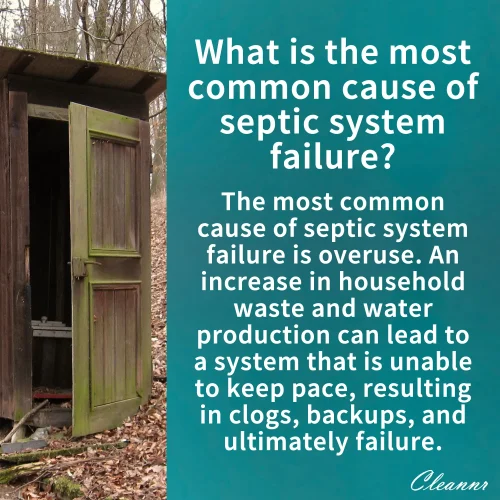A septic system is a crucial component of any household that relies on a private sewage system. However, septic systems are known to fail, and it can lead to a range of problems, including unpleasant odors, health hazards, and costly repairs. Do you know what is the most common cause of septic system failure?
The most common cause of septic system failure is overuse. An increase in household waste and water production can lead to a system that is unable to keep pace, resulting in clogs, backups, and ultimately failure. Besides, additional reasons are improper maintenance, clogging, installation flaws, chemical damage from household cleaners, and many others.
In this article, we will explore what is the most common cause of septic system failure, from overuse and improper maintenance to design and installation flaws. By educating ourselves about these common causes, we can take the necessary steps to ensure our septic systems function properly for years to come.
Contents
- What is the most common cause of septic system failure? List of things to consider
- Can heavy rain affect septic systems?
- What are the signs of a full septic tank?
- What happens when a septic system fails?
- How long can a septic tank go without being pumped?
- What is the average lifespan of a septic tank?
- Prevention of septic system failure
- FAQs
- Conclusion
What is the most common cause of septic system failure? List of things to consider

Septic systems are an important part of modern waste management, and even though it’s important to keep them septic safe, they can fail for several reasons.
Did you ever wonder what is the most common cause of septic system failure? Some common causes of septic system failure include:
1. Overuse
Overuse occurs when the system is unable to keep pace with the volume of waste and water being produced by the household.
To prevent overuse, it is important to manage the household’s water usage and ensure that the system is appropriately sized for the household.
Regular monitoring of the system can also help identify potential problems before they become serious issues.
2. Improper maintenance
Another common cause of septic system failure is improper maintenance. Neglecting regular inspections and cleanings can lead to clogs, backups, and other problems that can ultimately result in failure.
Regular maintenance by a professional can help prevent these issues and keep the system functioning effectively.
3. Clogging or blockages
Clogging and blockages can be caused by many things, including inappropriate disposal of non-degradable materials, such as wipes and feminine hygiene products. This can lead to slow draining, backups, and other issues that can put a strain on the system.
4. Age and wear and tear
Over time, septic systems can experience wear and tear that can cause them to fail. This is especially true for older systems that were not designed with modern standards in mind. Age can lead to corrosion, cracks, and other issues that can cause the system to malfunction.
5. Design and installation flaws
Design and installation flaws are another contributing factor to septic system failure. Incorrect sizing and placement of the system can result in a range of problems, from clogs and backups to system failure.
To ensure proper design and installation, it is important to work with a professional designer and installer who has experience and expertise in septic systems
6. Groundwater and soil conditions
Groundwater and soil conditions can also play a role in septic system failure. If the soil around the septic system is not permeable or if the water table is too high, the system can experience issues, such as flooding and pooling.
7. Chemical damage from household cleaners
Household cleaners, especially those that contain harsh chemicals, can be the answer to the question: What is the most common cause of septic system failure?
These chemicals can disrupt the delicate balance of bacteria that are responsible for breaking down waste, leading to backups, slow draining, and other issues. Try to avoid bad laundry detergents for septic systems.
Can heavy rain affect septic systems?
Many people are wondering can heavy rain affect septic systems. The short answer is, yes, heavy rain can have a significant impact on septic systems.
Septic systems rely on a delicate balance of bacteria and other processes to break down and remove waste, and heavy rain can disrupt this balance in many ways.
For starters, heavy rain can cause the water table to rise, which can result in groundwater flooding the septic system.
This can lead to several issues, such as dilution of the wastewater and a reduction in the concentration of bacteria, which can impact the effectiveness of the system.
What are the signs of a full septic tank?
A full septic tank can lead to several serious issues, including backups, slow draining, and even system failure. But what are the signs of a full septic tank?? Here are a few key signs to look out for:
- Foul odors: A full septic tank can release foul odors into your home, which can be a clear sign that the tank is full and in need of pumping.
- Slow draining: If your sinks, toilets, and showers are draining slowly, it could be a sign that your septic tank is full and needs to be emptied.
- Backups: A full septic tank can cause backups, which can result in sewage spilling out of your pipes and into your home.
- Soggy lawn: If you notice a soggy or spongy area on your lawn, it could be a sign that wastewater is not draining properly and is backing up into your yard.
If you’re experiencing any of these signs, it’s important to take action as soon as possible.
Failing to pump your septic tank regularly can lead to serious issues that can be both expensive and unpleasant to deal with.
What happens when a septic system fails?
So, what happens when a septic system fails? Septic system failure can have serious and far-reaching consequences for both your home and the environment.
When a septic system fails, raw sewage can escape from the tank and into the surrounding soil, contaminating groundwater and posing a health risk to people and animals. Septic system failure can also result in backups and overflows, which can cause serious damage to your home and possessions.
In addition to the immediate risks posed by a septic system failure, the long-term effects can be just as serious.
Failing septic systems can lead to the release of harmful pollutants into the environment, which can harm local ecosystems and wildlife.
How long can a septic tank go without being pumped?
If you are not sure how long can a septic tank go without being pumped, there are a few things you need to know about it.
The frequency at which a septic tank needs to be pumped depends on various factors such as the size of the tank, the number of people using it, and their water usage habits. On average, a septic tank should be pumped every 3-5 years.
However, it is recommended to have it inspected annually by a professional to ensure it is functioning properly and to avoid any potential issues.
What is the average lifespan of a septic tank?
The average lifespan of a septic tank can vary greatly depending on various factors, such as the material it is made of, the quality of installation, and the level of maintenance it receives.
In general, concrete septic tanks can last 25-30 years, while plastic tanks have a lifespan of 20-30 years. Fiberglass tanks typically have a shorter lifespan of 15-20 years.
However, proper maintenance, including regular pumping, can extend the life of a septic tank.
Neglecting maintenance, on the other hand, can significantly shorten the lifespan of a septic tank and lead to costly repairs or even the need for a replacement.
Prevention of septic system failure
Septic system failure can be a costly and unpleasant experience, but it can also be prevented with proper care and maintenance. Here are a few key steps you can take to help prevent septic system failure:
- Regular maintenance and inspections – Regular maintenance and inspections are crucial to the longevity and performance of your septic system. A professional inspector can check for signs of wear and tear, blockages, and other issues that can contribute to system failure.
- Proper usage of the septic system – This includes avoiding the use of harsh chemicals and excessive water usage, which can cause damage to the system over time.
- Educating oneself about the proper system maintenance – Educating yourself about the proper care and maintenance of your septic system can also go a long way in preventing failure.
FAQs
Here’s a list of frequently asked questions about what is the most common cause of septic system failure.
How can I prevent a septic system failure?
To prevent septic system failure, you should have your septic system inspected annually by a professional, avoid flushing non-degradable items down the toilet, conserve water, and have your septic tank pumped every 3-5 years.
What are common signs of a failing septic system?
Common signs of a failing septic system include slow-draining toilets and sinks, frequent backups, gurgling sounds in plumbing fixtures, and sewage odors.
If I smell a foul odor coming from my septic system, does that mean my system is failing?
A foul odor coming from a septic system can indicate a failure or an issue with the system. It is important to have it inspected promptly to determine the cause of the odor and address any potential issues.
What should I expect in a typical septic system inspection?
During a typical septic system inspection, a professional will check the tank for proper level and condition, inspect the drain field for signs of saturation or ponding, and evaluate the overall performance of the system.
Conclusion
In conclusion, after reading about what is the most common cause of septic system failure, homeowners need to have their septic systems inspected annually by a professional to ensure they are functioning properly and to identify any potential issues before they become more serious problems.
By taking steps to properly maintain your septic system, you can avoid costly repairs and extend the life of your system.
In light of this information, I encourage you to leave a comment and share your experiences with septic system maintenance. Your insights and stories can help others avoid potential problems and prolong the life of their septic systems. Happy cleaning!


